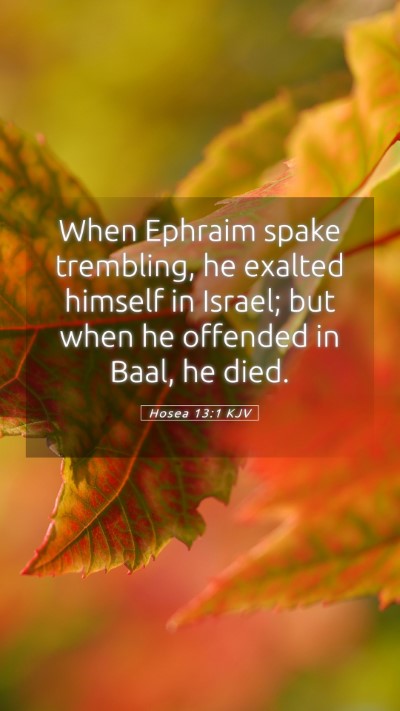Old Testament
Genesis Exodus Leviticus Numbers Deuteronomy Joshua Judges Ruth 1 Samuel 2 Samuel 1 Kings 2 Kings 1 Chronicles 2 Chronicles Ezra Nehemiah Esther Job Psalms Proverbs Ecclesiastes Song of Solomon Isaiah Jeremiah Lamentations Ezekiel Daniel Hosea Joel Amos Obadiah Jonah Micah Nahum Habakkuk Zephaniah Haggai Zechariah MalachiHosea 13:1 Meaning
What is the meaning of Hosea 13:1?
When Ephraim spake trembling, he exalted himself in Israel; but when he offended in Baal, he died.
Hosea 13:1 Bible Verse Meaning
Understanding Hosea 13:1
The verse Hosea 13:1 states: "When Ephraim spoke, there was trembling; he exalted himself in Israel; but when he offended in Baal, he died." This passage captures the essence of Israel's downfall through the lens of Ephraim, a significant tribe within the northern kingdom. Below is a detailed analysis that incorporates insights from renowned biblical commentaries, providing readers with a comprehensive understanding of this scripture.
Meaning of the Verse
At the heart of Hosea 13:1 lies the theme of pride, sin, and subsequent judgment. The verse highlights how Ephraim, which represents a significant portion of Israel, experienced a moment of glory and power. However, this pride led to their downfall due to idolatry, specifically in their worship of Baal.
- Pride and Power: As noted by Matthew Henry, Ephraim's exaltation reflects human pride and the tendency to stray from God in times of strength.
- The Dangers of Idolatry: Albert Barnes emphasizes that the turn to Baal worship signifies a direct violation of God's commands, leading to spiritual death.
- Consequences of Sin: Adam Clarke points out that the 'death' mentioned here symbolizes the severance from God's favor and the consequences of turning away from Him.
Commentary Insights
Commentaries shed further light on the implications of this verse:
- Matthew Henry: Discusses how Ephraim's initial rise brought about respect and fear among the nations, suggesting that status can often lead one to forget their dependence on God.
- Albert Barnes: Highlights that Ephraim’s downfall serves as a warning of the dangers of apostasy, showcasing that once they turned to Baal, they effectively cut themselves off from the true source of life.
- Adam Clarke: Connects this to the broader narrative of Israel's history, illustrating how failure to maintain faithfulness inevitably leads to tragedy.
Historical Context
This verse must be viewed within the historical framework of the divided kingdom of Israel and Judah. During Hosea's prophetic ministry, Israel was a kingdom characterized by moral decay, social injustice, and rampant idolatry.
Understanding the context in which Hosea delivered this message enhances the interpretation of the scripture:
- Idolatry in Israel: The worship of Baal was prevalent during Hosea’s time and represented a significant challenge to the worship of Yahweh.
- Social and Political Turmoil: Ephraim’s power was coupled with instability, which mirrors the spiritual disarray faced by the nation.
- Prophetic Warning: Hosea’s prophecy acts as a dire warning about the consequences of abandoning God.
Application of the Verse
Hosea 13:1 is not just a historical account; it provides profound lessons applicable to contemporary readers:
- Recognizing Pride: Believers must remain humble and not allow success or status to lead them away from God.
- Avoiding Idolatry: In modern contexts, idolatry can take many forms, including materialism, work, and relationships. It is crucial for individuals to evaluate their priorities and ensure they place God first.
- Seeking Spiritual Renewal: Just as Ephraim faced judgment, contemporary believers are reminded of the need for constant vigilance in their faith and repentance when straying from God.
Related Scripture References
To deepen understanding, the following cross-references are pertinent:
- Jeremiah 2:13: Highlights forsaking the fountain of living waters.
- 1 Corinthians 10:12: Warns believers about the dangers of pride and falling into temptation.
- Romans 11:22: Discusses the kindness and severity of God, urging believers to remain steadfast in faith.
Conclusion
Hosea 13:1 serves as a stark reminder of the consequences of pride and idolatry. By examining this verse through the lenses of biblical scholarship, we find vital lessons on the importance of maintaining one's faithfulness to God. Regular engagement with biblical texts—and the tools available in Bible study groups, online resources, and comprehensive guides—can aid individuals in grasping the deeper meanings of scripture.


